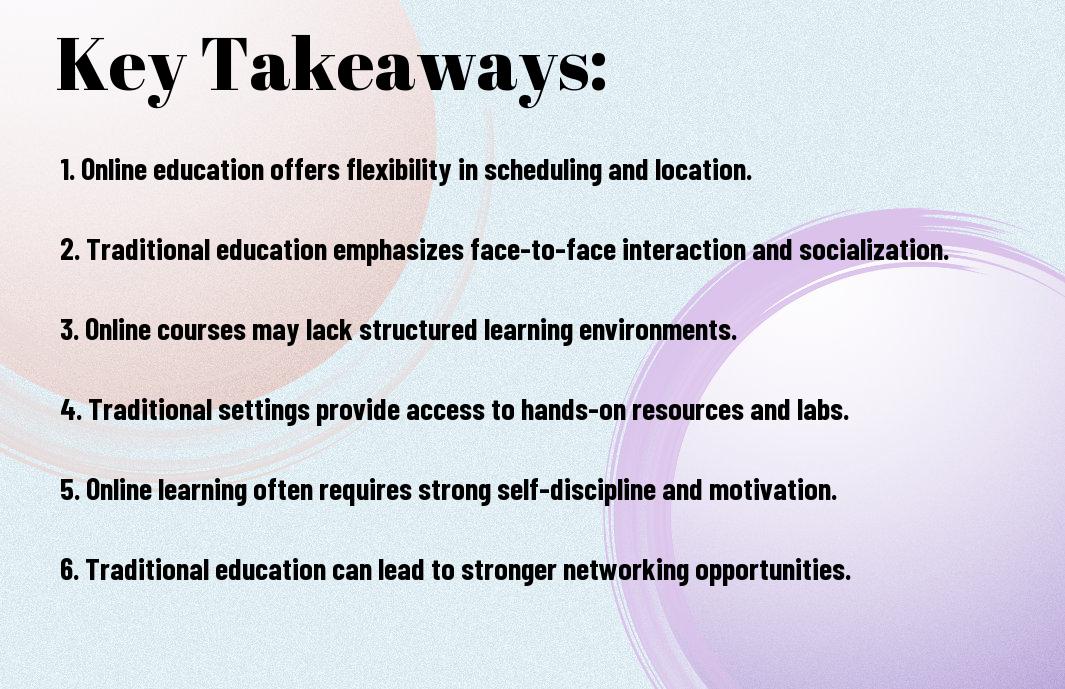As you consider your educational options, you’re likely weighing the advantages and disadvantages of online and traditional learning. You want to make an informed decision that suits your lifestyle and learning style. Your choice between online and traditional education will impact your academic experience, so it’s vital to explore the pros and cons of each option. You’ll need to think about factors like flexibility, cost, and accessibility to determine which path is best for you.
Key Takeaways:
When considering online vs. traditional education, there are several factors to weigh. Here are the main points to consider:
- The flexibility of online learning allows students to complete coursework on their own schedule, which can be beneficial for those with work or family obligations.
- Traditional education provides face-to-face interaction with instructors and peers, which can enhance the learning experience and provide opportunities for immediate feedback.
- Online courses often offer lower costs and increased accessibility, making higher education more attainable for a wider range of students, including those in remote locations.
- The structure of traditional education can provide students with a sense of accountability and discipline, as they are required to attend classes and adhere to a set schedule.
- Online education requires self-motivation and technical skills, as students must be able to navigate digital platforms and manage their time effectively to succeed in an online learning environment.
Advantages of Online Education
While exploring your options, you can learn more about online education by visiting Online Classes vs. Traditional Classes: Advantages & Disadvantages. This will help you make an informed decision.
Flexibility and Accessibility
On top of traditional classroom settings, online education offers flexible scheduling, allowing you to access your courses at any time.
Personalized Learning Experience
An added benefit of online education is that it provides a personalized learning experience tailored to your needs and learning style.
Another aspect of personalized learning is that you can learn at your own pace, pausing or repeating sections as needed, which helps you better understand and retain the material, thus enhancing your overall learning experience.

Disadvantages of Online Education
If you’re considering online education, you should be aware of its drawbacks. You can find more information about the pros and cons of online learning at Distance Learning vs. Traditional Learning: Pros and Cons.
Limited Social Interaction
Any time you engage in online learning, you may miss out on social interactions, which are imperative for your personal and professional growth.
Technical Issues and Distractions
Distractions at home or technical issues can hinder your ability to focus and learn effectively in an online environment.
Disadvantages of technical issues and distractions can significantly impact your online learning experience, as you may encounter problems with your internet connection, computer, or other technical difficulties, which can frustrate you and hinder your ability to complete your coursework, and you should be prepared to address these challenges to succeed in online education.
Advantages of Traditional Education
To begin with, traditional education offers several benefits that can enhance your learning experience. You will have access to hands-on training, personalized attention, and a more engaging learning environment.
Face-to-Face Interaction and Networking
Interacting with your peers and instructors in person allows you to build relationships and establish a network of contacts that can benefit your future career. You will have opportunities to participate in discussions, ask questions, and collaborate with others on projects, which can help you develop crucial communication and teamwork skills.
Structured Learning Environment
Against the flexibility of online learning, traditional education provides a structured schedule and environment that can help you stay focused and motivated. You will have a set routine, clear expectations, and regular feedback from your instructors, which can help you stay on track and achieve your academic goals.
Further, a structured learning environment can also help you develop good study habits, time management skills, and self-discipline. You will be required to attend classes regularly, complete assignments on time, and prepare for exams, which can help you establish a sense of responsibility and accountability for your learning. This, in turn, can help you develop a strong work ethic and a growth mindset that can benefit you throughout your life.
Disadvantages of Traditional Education
Unlike online education, traditional education has several drawbacks that can hinder your learning experience. You may encounter rigid schedules, limited course offerings, and high costs, which can be a significant burden on your time and finances.
Limited Accessibility and Flexibility
By attending traditional educational institutions, you are often bound by geographical constraints and fixed schedules, limiting your ability to access educational resources and learn at your own pace.
High Costs and Resource Intensive
Among the significant downsides of traditional education are the high costs associated with attending a physical institution, including tuition fees, transportation, and accommodation, which can be a substantial strain on your financial resources.
Plus, the costs of traditional education extend beyond tuition fees, as you will also need to consider the expense of textbooks, equipment, and other learning materials, which can add up quickly and deplete your budget, making it challenging for you to pursue your educational goals without significant financial burden.

Comparison of Effectiveness
Despite the differences between online and traditional education, you can evaluate their effectiveness by considering various factors. Check out Online Classes vs Traditional Classes – Find the Best for You to learn more.
| Online Education | Traditional Education |
|---|---|
| Flexibility | Structure |
Academic Performance and Outcomes
Among the key aspects to consider when evaluating online and traditional education, you’ll find that academic performance and outcomes are significant. You’ll want to assess how each method impacts your learning experience.
Student Satisfaction and Engagement
Before making a decision, you should consider student satisfaction and engagement. You’ll find that both online and traditional education have their strengths and weaknesses in this area.
Engagement is a vital aspect of your educational experience, and you’ll want to choose the method that best supports your needs. As you explore online and traditional education, consider how each approach will impact your motivation and participation in the learning process, and how it will help you achieve your academic goals.
Future of Education
Not surprisingly, the future of education is likely to be shaped by technological advancements and changing learner needs. You will see a shift towards more flexible and personalized learning experiences.
Blended Learning Models
Following the success of online learning, you can expect to see more blended learning models emerge, combining the best of online and traditional education to create a more effective learning experience for you.
Emerging Trends and Technologies
Obviously, one of the most exciting developments in education is the integration of emerging trends and technologies, such as AI and VR, to enhance your learning experience.
Models like adaptive learning platforms and gamification will become increasingly popular, allowing you to take control of your learning and engage with complex subjects in a more interactive way, helping you to stay motivated and achieve your learning goals.
Final Words
Summing up, you now have a clearer understanding of the pros and cons of online vs. traditional education. You can weigh your options and decide what suits your learning style and needs. Your decision will depend on your personal preferences, schedule, and goals. Consider your priorities and make an informed choice that benefits your educational journey, allowing you to achieve your full potential.
FAQ
Q: What are the main advantages of online education compared to traditional education?
A: Online education offers several benefits, including flexibility and convenience, as students can access course materials and complete assignments at their own pace and from any location. Additionally, online education often provides a wider range of course options and can be more cost-effective than traditional education. Online courses also allow students to learn at their own speed, which can be particularly helpful for those who need more time to grasp certain concepts or for those who can quickly absorb information and want to move ahead. Furthermore, online education reduces the need for commuting, which saves time and money, and it also provides access to courses that may not be available locally.
Q: What are the disadvantages of online education in comparison to traditional education, and how can they be addressed?
A: One of the primary disadvantages of online education is the lack of face-to-face interaction with instructors and peers, which can lead to feelings of isolation. Technical issues can also disrupt the learning experience. Moreover, online education requires a high degree of self-motivation and discipline, as students must stay on track without the structure of a traditional classroom. To address these issues, many online educational institutions implement interactive tools and features that facilitate communication and community building among students and faculty, such as discussion forums, live chats, and video conferencing. Regular technical support is also available to minimize disruptions. Furthermore, setting a dedicated schedule and creating a conducive study environment can help students stay motivated and disciplined throughout their online courses.
Q: How do the learning outcomes of online education compare to those of traditional education, and what factors influence the effectiveness of each method?
A: Research indicates that the learning outcomes of online education can be comparable to, if not sometimes superior to, those of traditional education, depending on various factors such as the quality of the course design, the technology used, and the engagement of the students. The effectiveness of both online and traditional education methods is heavily influenced by the learner’s individual learning style, the subject matter being taught, and the level of interaction with the instructional material and with peers and instructors. For instance, some subjects that require extensive hands-on training might be better suited to traditional educational settings, while others that are more theoretical or based on individual study may thrive in online environments. Ultimately, the success of either method depends on how well the educational content is tailored to meet the needs and preferences of the learners, as well as the support systems in place to ensure student success.


